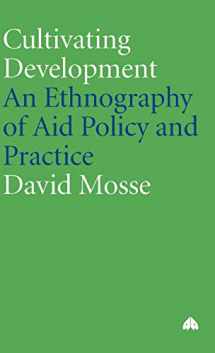
Cultivating Development: An Ethnography of Aid Policy and Practice (Anthropology, Culture and Society)
ISBN-13:
9780745317991
ISBN-10:
0745317995
Edition:
First Edition
Author:
David Mosse
Publication date:
2005
Publisher:
Pluto Press
Format:
Hardcover
336 pages
FREE US shipping
Book details
ISBN-13:
9780745317991
ISBN-10:
0745317995
Edition:
First Edition
Author:
David Mosse
Publication date:
2005
Publisher:
Pluto Press
Format:
Hardcover
336 pages
Summary
Cultivating Development: An Ethnography of Aid Policy and Practice (Anthropology, Culture and Society) (ISBN-13: 9780745317991 and ISBN-10: 0745317995), written by authors
David Mosse, was published by Pluto Press in 2005.
With an overall rating of 3.8 stars, it's a notable title among other
books. You can easily purchase or rent Cultivating Development: An Ethnography of Aid Policy and Practice (Anthropology, Culture and Society) (Hardcover) from BooksRun,
along with many other new and used
books
and textbooks.
And, if you're looking to sell your copy, our current buyback offer is $0.56.
Description
Development agencies and researchers are preoccupied with policy; with exerting influence over policy, linking research to policy and with implementing policy around the world.But what if development practice is not driven by policy? Suppose that the things that make for 'good policy' - policy that legitimises and mobilises political support - in reality make it impossible to implement?By focusing in detail on the unfolding activities of a development project in western India over more than ten years, as it falls under different policy regimes, this book takes a close look at the relationship between policy and practice in development. David Mosse shows how the actions of development workers are shaped by the exigencies of organisations and the need to maintain relationships rather than by policy; but also that development actors work hardest of all to maintain coherent representations of their actions as instances of authorised policy. Raising unfamiliar questions, Mosse provides a rare self-critical reflection on practice, while refusing to endorse current post-modern dismissal of development.


We would LOVE it if you could help us and other readers by reviewing the book
Book review

Congratulations! We have received your book review.
{user}
{createdAt}
by {truncated_author}


